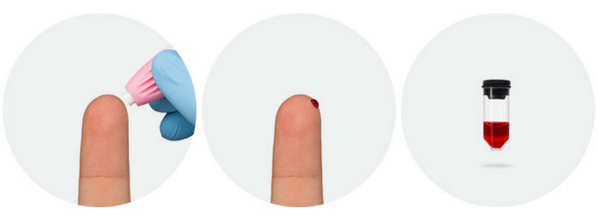"A full plan of correction will be submitted to CMS within days," Buchanan said. (For the full statement, scroll to the bottom.)
Read the entire CMS letter here -- more after the jump.
The government action underscores negative publicity resulting from a string of articles by The Wall Street Journal alleging serious problems with the company's patented blood-testing process, which is supposed to require blood that can be collected with just the prick of a finger in order to test for a host of substances and medical conditions. But currently, it uses the technology for just one test, to detect herpes.
Full statement from Theranos:
We received a report from CMS documenting their findings from a scheduled survey in our Newark, CA lab that took place last fall. In line with our commitment to leading the lab industry in transparency, we wanted you to hear directly from us regarding this survey and report:
This survey of our Newark, CA lab began months ago and does not reflect the current state of the lab. As the survey took place we were simultaneously conducting a comprehensive review of our laboratory’s systems, processes and procedures to ensure that we have best-in-class quality systems. We value engagement with our regulators, and are committed to ensuring that all our labs operate at the highest standards. We are still reviewing the report, but we addressed many of the observations during the survey and are actively continuing to take corrective action. A full plan of correction will be submitted to CMS within days.
CMS’s findings included standard and condition-level deficiencies, and one finding at the “immediate jeopardy” level, based on a condition-level deficiency in one specific area – hematology. To be clear, that finding does not apply to the whole lab, and none of these findings relate to our Arizona lab, where we currently process over 90 percent of our tests.
Three of the condition-level deficiencies are related to personnel, such as documentation and oversight; one is related to analytic systems; and the one referenced above to hematology. CMS found that within hematology, certain policies, procedures, and associated events did not meet the relevant standards.
We were grateful to have our regulators directly review our alternative proficiency testing processes for our proprietary technologies and related operations. (See more on that at the end of this note below.)
As part of our review, we have made policy and personnel changes in our Newark, CA lab, including adding a new CLIA lab director with the conclusion of our lab director search. Our new lab director, Dr. Kingshuk Das, is a board-certified pathologist and M.D. and, among other accomplishments, an Associate Medical Director of UCLA’s Clinical Laboratories. We have also brought on a new clinical consultant, Dr. Waldo Concepcion, the Chief of Clinical Transplantation and Professor of Surgery at Stanford University Medical Center.
We value engagement with our regulators, which helps us build best-in-class systems, and are committed to ensuring that all our labs operate at the highest standards.
Theranos remains the sole company to call for - and voluntarily submit itself to - stronger regulatory oversight. Theranos has voluntarily committed to FDA review of its laboratory-developed tests and publishing its prices, lab proficiency testing pass rate, customer satisfaction scores, guest visit times, and more, to realize a system in which individuals become more engaged with their health, and early detection and prevention of disease become realities.
***
CMS issued no findings on the following allegations mentioned in recent media coverage:
• An allegation of proficiency testing “cheating”
• An allegation that management “instructed lab employees to keep testing patients” despite indications of purported problems
• An alleged complaint to CMS in which an R&D employee allegedly “deleted” QC data
• An allegation that Theranos improperly hid the existence of its lab holding its proprietary technologies
• An allegation that Theranos manipulated data to make its proprietary machines seem more accurate
• An allegation of a “dilution” protocol causing inaccurate results
• An allegation regarding the handling of a purported “proficiency-testing sample” in February 2014
